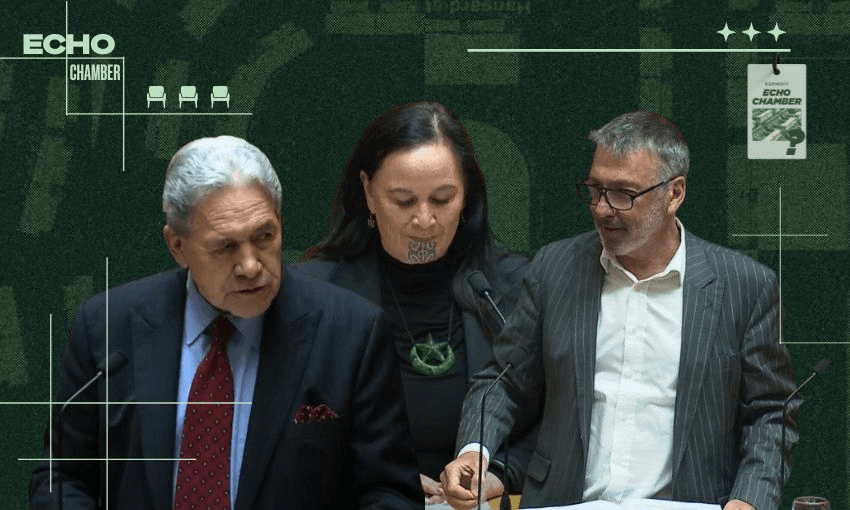While you were distracted by the grumblings around Te Pāti Māori and the prime minister’s polling, parliament managed to get some work done.
Echo Chamber is The Spinoff’s dispatch from the press gallery, recapping parliament’s sitting week. Columns are written by politics reporter Lyric Waiwiri-Smith.
The middle of a three-week sitting block, with only two more blocks left until our MPs break for the summer, can test a parliamentarian’s stamina and resolve. The clamour through question time and general debates flip-flopped between boisterous and bland this week, catch-up had to be played over a conscience vote and, if you asked speaker Gerry Brownlee in his new role as fashion police, dress standards were plummeting.
Then there was Te Pāti Māori, whose internal bickering stole the spotlight and provided the government with the perfect cover to duck under and advance a bill that goes against everything that party stands for. But before the controversial Marine and Coastal Area Amendment Bill (MACA) entered the committee of the whole house stage on Tuesday afternoon, question time kicked off as a relatively tame sideshow to whatever debates were being held behind closed doors and inboxes.
Yet again, another stressful week to be Gerry Brownlee.
In typical Winston Peters fashion, the foreign affairs minister couldn’t address the House without letting a little bit of casual racism slip, telling the Greens’ Ricardo Menéndez March “adios, amigo” when they shared barbs over the ceasefire in Gaza. Te Pāti Māori’s embattled Mariameno Kapa-Kingi was noticeably absent, and continued to be for the rest of the week. And as for the security guards around the building: they haven’t been so popular since one of them told deputy prime minister David Seymour off for driving a Land Rover up the parliamentary steps.
Following question time, there was the postponed vote on the Broadcasting (Repeal of Advertising Restrictions) Amendment Bill, the only piece of legislation Paul Goldsmith has managed to pass in his role as minister for media and communications. It probably would’ve been last week’s news if there hadn’t been fewer than 20 MPs around to submit a conscience vote last Thursday – in the end, having only members of NZ First, the Greens and Te Pāti Māori walk through the “noes” door wasn’t enough to stop the bill at its third reading.
Duncan Webb with his wide knowledge of medieval law.
Later, debates turned to the MACA bill, giving MPs the opportunity to pick the legislation apart clause by clause. How is it that the government could ignore the customary rights of iwi and hapū to coastal and marine areas, Labour’s Duncan Webb asked, when the UK has trout-fishing rights to rivers that have been recognised since medieval times? And why are mana whenua being asked to prove they have had physical use of their land, Labour’s Arena Williams asked, when no one’s asking Andy Foster to dig up his backgarden every few months just to prove that he can? All very great questions, and maybe we’ll get to discuss them more at the bill’s third reading.
By Wednesday, the only thing anyone wanted to talk about were polls and whether it was OK to show feet in our honourable debating chamber, à la Te Pāti Māori’s Oriini Kaipara during her maiden speech last week. Question time was largely business as usual, but poor National backbench MP Dana Kirkpatrick had her moment to pass patsies to education minister Erica Stanford cut short by a very excitable Parmjeet Parmar of Act. While Parmar’s party leader David Seymour took her question on charter schools and the like, Kirkpatrick frowned and silently shook her head until the feeling of being cheated out of her big moment blew over.
Maybe Kirkpatrick could take some notes from ministers Shane Jones and Peters, who wouldn’t let anyone get in their way and did their best to get in everybody else’s way. When the Greens’ Teanau Tuiono questioned Jones over a recently released marine environment report, Jones let him know the planet was “more than capable of saving itself”. And when Tuiono tried to ask another question, Peters – refusing to sit back down – kept interrupting until the speaker let him share his piece, that “we’d like some old-fashioned rules restored to their place”. The reception from the opposition side over those comments might have gone down better if people followed the old-fashioned rule of respecting your elders.
The parliamentarians meet the petitioners.
Then on Thursday, a moment for parliament to catch its breath: the news of former prime minister Jim Bolger’s death saw the House adjourned until 2pm, bringing back party leaders who typically use the last day of the sitting week to return to their electorates (or try to make their first policy announcement in Auckland, in the case of Chris Hipkins). Sure, there could be something to be said about halting the House’s proceedings for a parliamentarian who hasn’t been in office since the 1990s, but given it’s the last day of the school week, graces can be given.
But for those who showed up for their morning classes, MPs from the Greens, Labour and Te Pāti Māori gathered on parliament’s forecourt to receive a 19,000-strong petition – initiated by Hone Harawira – against MACA. The man presenting the petition acknowledged the death of singer D’Angelo alongside Bolger, an astute comparison that might have gone over the heads of the Pākehā spectators in the crowd: alongside the Treaty settlements process, the Brown Sugar album is integral to surviving the effects of colonisation.

